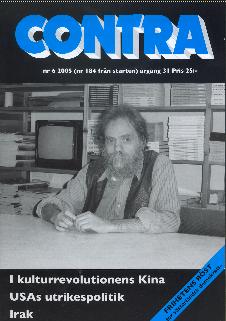
Julio Ferrer – young student in the service of Communism
– interviewd by Fredrik Bermar
Julio Ferrer grew up in Spain, turned Communist, went to China and found himself in the middle of the Cultural Revolution. Today he lives in Stockholm and can with some perspective tell about a dark time.
When Mr Ferrer travelled to China at the invitation of the Chinese Communist Party the Cultural Revolution was in full swing. Mass murders were organized by rural youth roaming through Peking. Mr Ferrer and his friends were lucky not to become victims themselves, as foreigners were interesting prey for the revolutionaries. Only at the end of their visit the hosts started to inform their guests what happened in China, but at that time they had already seen it all. “Foreigners had been killed” they were told, but when the hosts were asked for details they turned silent. They were afraid and it was impossible to get any detailed information on what happened. The conclusion was that foreigners were killed in order to get rid of witnesses that would have been able to tell about the famine that caused the death of millions of Chinese. The Cultural Revolution had an evident xenophobic and racist element in it.
Iraq – to learn from the British
by Tommy Hansson
Project Iraq is often presented as a lost case in media, impossible for the Bush administration and the democratic forces in Iraq to lead to a succesful end. This should however not be the case. The British examples from Malaya, Borneo and Oman could be good examples for the democratic forces to follow.
Passwords with a meaning
by C G Holm
Since Contra # 6 1998 page 2 has included a password, used to reach the “closed” part of the Contra web site. The passwords are not created by chance, but they always have an important message to tell. The article shows what is behind.
Religion in the history of the United States
by Allan C. Brownfeld
The role of religion in daily life in the US is a matter for discussion and controverse. Some people want to completely expell religion from the public sphere, as the Constitution stipulates a “wall” between chuch and government. Others advocate that the Constitution only stipulates neutrality between different creeds. Allan C. Brownfeld analyzes what the Constitution really means in this matter.
Turkey within or outside the European Union?
by Christer Arkefors
Should Turkey be invited to join the European Union or not? The majority of political leaders in Europe seem to be in favour of a Turkish membership, but opinion polls clearly show that the electorate has another view. One reason for the negative attitude is that only a small part of Turkey is located in Europe, but could the European Union exclude people that are real Europeans? And if so, what about Russia that could ask for membership in the future. Another argument against Turkey is that the country is moslem. Which is not true. A vast majority of the Turkish people are moslems, but the country is secular and without any traces of fundamentalism. And if moslems shouldn’t be welcome, how to handle Bosnia?
The Hammer and Sickle in Sweden
by Tommy Hansson
When Communist Sweden under the Great leader Valter Jönsson is to celebrate “forty happy years as a Communist state” in 1989 the hammer and sickle have since a long time replaced the three royal crowns on the top of the City Hall Tower in Stockholm. Party propagandists work to create a worthy celebration in spite of the tide of freedom that is rising in the surrounding Europe. Reformists want to stop the celebration… That is the scenario for a contrafactual book which is discussed by Contra editor Tommy Hansson.
Realists against neocons in US foreign policy
by Fredrik Runebert
During the past decades the idelogical battle within the Republicans have been fought between “realists” and “neocons”. Those that have a pragmatic view on all foreign relations and those that think that the US must fulfill its mission to promote freedom all over the world.
During the administration of George H. W. Bush the realists had the most favoured position in the administration, but with his son George W. Bush it seems to be the other way around. Contra correspondent Fredrik Runebert analyzes the question starting from an article by Charles Krauthammer published in “Commentary” magazine.

